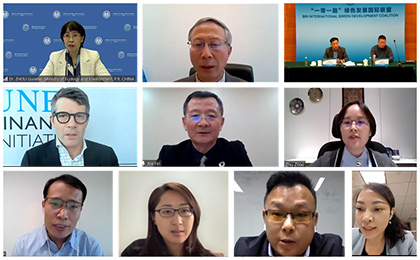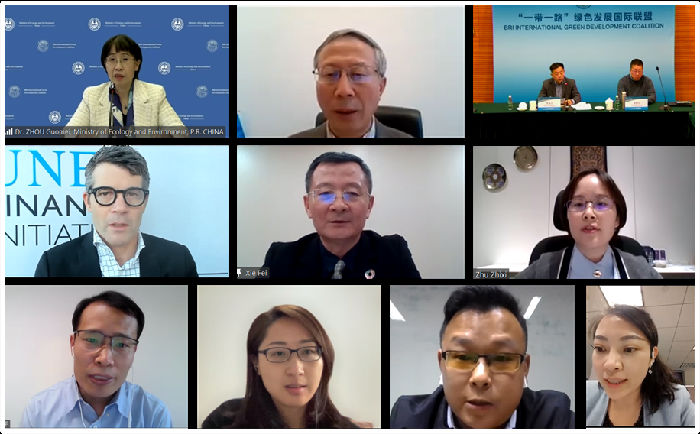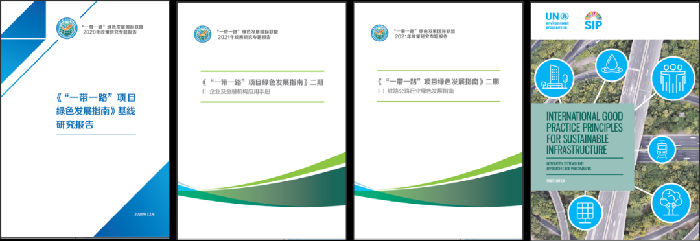


On December 6, 2021, BRI International Green Development Coalition (BRIGC) and United Nations Environment Programme (UNEP) co-hosted the Expert Seminar on BRI Sustainable Infrastructure Development in Beijing. The seminar discussed the demand, development prospects and industry practices of the sustainable infrastructure development under the BRI, and aligned Green Development Guidance for BRI project of BRIGC with International Good Practice Principles for Sustainable Infrastructure of UNEP to further the supportive role of sustainable infrastructure in BRI high-quality development.
Ms. Zhou Guomei, Director General of the Department of International Cooperation, Ministry of Ecology and Environment of China (MEE), and Mr. Tu Ruihe, Head of UNEP China Office, attended the seminar and delivered the opening remarks. Mr. Li Yonghong, Deputy Director-General of Foreign Environmental Cooperation Center (FECO), MEE and Mr. Zhang Jianyu, International Coordinator of BRIGC Advisory Committee and Executive President of BRI Green Development Institute (BRIGDI), moderated the seminar. The seminar also attracted more than 200 representatives from over 50 Chinese and international institutions to join online and offline, including inter alia UNEP, United Nations Office for South-South Cooperation (UNOSSC), United Nations Institute for Training and Research (UNITAR), MEE, the Ministry of Finance of China, the Ministry of Commerce of China, and environmental departments of BRI participating countries, Beijing Organizing Committee for the 2022 Olympic and Paralympic Winter Games (BOCWOG), China International Contractors Association (CHINCA), Asian Infrastructure Investment Bank (AIIB), China Development Bank (CDB), Bank of China (BOC), State Power Investment Corporation Limited (SPIC), Pakistan-China Institute, Tongji University and Wuhan University.

Developing sustainable infrastructure is an important measure to promote high-quality BRI development to achieve tangible new results. Ms. Zhou Guomei pointed out that sustainable infrastructure development should strengthen sustainability from three aspects, notably ecological environment, social governance and project management. With focus on the two key areas of infrastructure connectivity and alignment of rules and standards, it is important to advance the construction of high-quality, resilient and sustainable infrastructure projects in an orderly manner to promote high-quality BRI development. Mr. Tu Ruihe noted that infrastructure connectivity plays a vital part in BRI development. He hoped that China can share its best practices and experiences with developing countries on green development, pollution control, climate change, and biodiversity conservation, under the guidance of new development vision and ecological civilization.

In the keynote speech session, Dr. Zhu Yuan from BRIGC Secretariat introduced the progress of the study on Green Development Guidance for BRI Projects (Guidance project). Launched in 2019, the study has delivered a series of practical outcomes through Baseline Study Report, Application Guide for Enterprises and Financial Institutions, and Guide for Key BRI Sectors - Highways and Railways. The study puts focus on the impact of BRI projects in areas of environmental pollution, biodiversity conservation and climate change. It has developed classification and assessment guidance for BRI projects, including energy and transport infrastructure projects, which have gained close attention at home and abroad. Ms. Gu Beibei, the Sustainable Infrastructure Specialist from UNEP, shared the International Good Practice Principles for Sustainable Infrastructure (The Principle) and practice cases, which include ten good practice principles and management decision bases for the whole life-cycle sustainability of infrastructure projects from a global and systematic perspective.
The thematic discussion was divided into two parts.
The first part discussed “BRI Sustainable Infrastructure: Industry Practices and Prospects”. Ms. Liu Xinping, Director of the Sustainable Development Office of the General Planning Department, BOCWOG, introduced the Sustainability in Beijing Winter Olympic Games and the actions and measures taken to create positive environmental impacts, regional development and a better livelihood. Mr. Xie Fei, Director of the China Public Private Partnerships Center (CPPPC), shared industrial practices in which PPP approach supports the sustainable development of BRI infrastructure projects. He recognized the application of the Guidance Project and the Principle could facilitate the development of an international standard system on sustainable infrastructure to meet the development demand of BRI participating countries. Mr. Shang Shengping, Director of Strategy and Consulting Department, CHINCA, said that the Association has established two industrial sustainable development standards in line with the Guidance Project and the Principe, which are Guide of Social Responsibility for Chinese International Contractors and Guidelines of Sustainable Infrastructure for Chinese International Contractors (SIG). The Association is happy to cooperate with the BRIGC and UNEP to strengthen the visibility and dissemination of standards and facilitate the convergence and application of standards, so as to support Chinese environmental consulting businesses to “go global”. Mr. Guo Yu, Director of International Business Department, SPIC, introduced SPIC’s industrial practices and strategic objectives in supporting green and low-carbon energy development and providing intelligent power solutions. He mentioned that in the future, SPIC’s investment in the globe as well as in BRI participating countries will predominantly be in clean energy such as photovoltaic and wind power and clean energy installed capacity will take up over 90% of the total capacity to accelerate the transition from the traditional power generator to green and low-carbon power supplier.
The second part was the “Role and Development Needs of Financial Institutions”. Mr. Eric Usher, Head of the UN Environment Programme Finance Initiative (UNEP FI), pointed out that the integration of sustainable investment principles such as the Equator Principles and the UN Principles for Responsible Investment with responsible investment frameworks (i.e. ESG, Environment, Social and Governance) has been widely recognized and applied by financial institutions. China is expected to play an active role in green finance to enhance the alignment between similar standards. Ms. Zhu Zhixi, Environmental Expert of AIIB, introduced the Infrastructure for Tomorrow project of AIIB and the key steps and actions taken to apply the AIIB Environmental and Social Framework in the whole project life cycle. She said that AIIB stands ready to help developers, contractors and supervisors going abroad to enhance their environmental and social management to promote global cooperation on sustainable infrastructure. Ms. Fan Binbin, Manager of Credit Administration Department, BOC, addressed that, in recent years, banks have gradually taken ESG factors into consideration to tighten the requirements for environmental risk management. The Guidance Project and its outcomes have given positive guidance for financial institutions. BOC will continue to give full play to its international and comprehensive advantages to actively support BRI green and low-carbon development.
Against the backdrop of global post-pandemic green recovery and low-carbon transition, the seminar discussed the needs and potential for sustainable infrastructure development to respond to the international community’s concern about high-quality, resilient and sustainable infrastructure. It has provided recommendations and guidance to enterprises and financial institutions to participate in sustainable infrastructure development under the BRI and has obtained favorable results.
Source:<https://mp.weixin.qq.com/s/SzznyffUOQSdHS5pT9d5oQ>